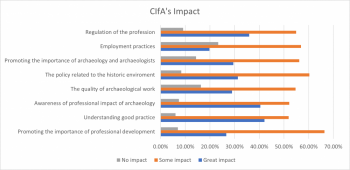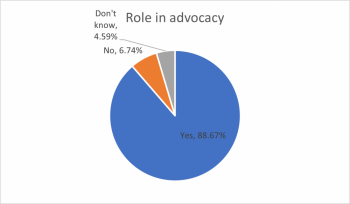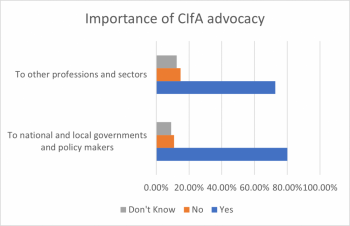Thank you to everyone who responded to the member survey. This survey is released every other year and the results help CIfA to steer our actions over future years. A series of bulletins will be sent out over the next few months with the breakdown of the survey's results.
The 2020 members survey had 665 respondents, 17.58% of the total membership (3783). This is a slightly lower engagement to the 2018 survey, 19.79% of the membership responded (735 respondents). In 2016 15.85% of the membership responded (526).
Advocacy
We asked what members thought about CIfA's advocacy and its impact and visibilty. The information below demonstrates what members value from the Institute's advocacy work and areas for development.
Impact on particular factors

We asked members to rate the Institute’s impact on several factors. Six respondents skipped this question.
Understanding good practice, impact on policy pertaining to the historic enviroment, awareness of the professional impact of archaeology, and regulation of the profession are seen to be areas where CIfA has great impact. Employment practices were deemed CIfA’s least impactful area with under a quarter of respondents choosing this (23.35%). Similar to the 2018 survey results, most respondents see CIfA having a level of impact across all given areas.
CIfA as an advocate for archaeology

This question asked members whether they felt CIfA’s role as an advocate for archaeology was important. Two skipped this question. This has remained a majority of “Yes” answers (88.67%), but is a slight decrease from the 96% response in the 2018 survey.
Importance of CIfA advocacy

We asked all respondents about the importance of the Institute's advocacy to other professions and sectors and to national and local governments and policy makers. This was skipped by two respondents. Both categories show that most respondents think CIfA has an important role in advocacy to both of these areas.
We hope you find these results interesting.
One of the major roles of CIfA is to advocate for archaeology, either alone or as part of a wider group, depending on the circumstances. Through this advocacy work CIfA influences policy and decision makers and works to make sure the historic environment is considered and protected. You can find more information on the Institute's current advocacy work and how you can get involved here.
Look out for the next bulletin coming shortly, about reflections on CIfA's membership benefits, opportunities and professional conduct processes.


